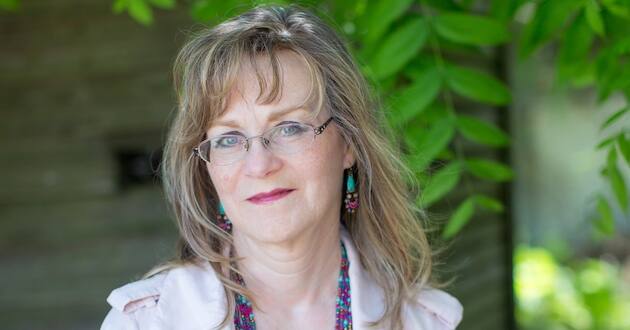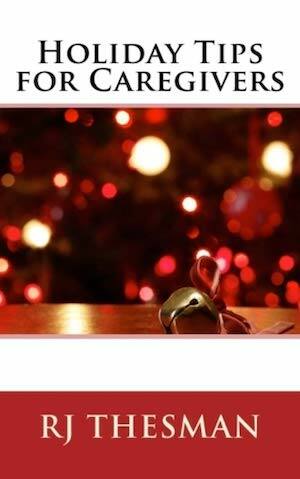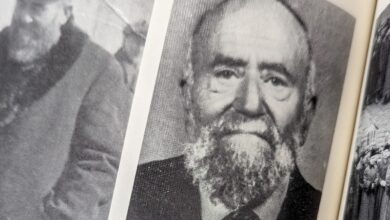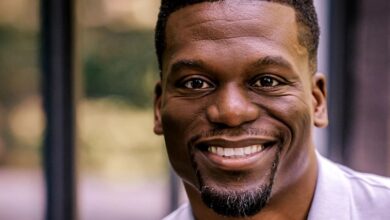RJ Thesman: Helping Caregivers Through the Holiday Season

When a disastrous fire thrust RJ Thesman’s father into trauma-induced dementia, she and her family began to learn firsthand about what’s involved in caregiving. While RJ’s mother, a nurse, was sure she could take care of her beloved husband, the family saw the stress this caused during the ten years of dementia care leading to his death.

When RJ’s mother was diagnosed a few years later with Alzheimer’s and an inoperable brain tumor, her children wondered if part of it was brought on by stress. As RJ and her siblings walked the journey with their mother, RJ, the researcher of the family, began to delve into the facts and studies.
Her findings in the world of dementia and Alzheimer’s eventually led RJ to write the Reverand G books, a ficiton series about a pastor who learned she was developing Alzheimer’s. But RJ also kept notes and developed a book designed to help people, like her family, who are struggling with caregiving at one of the most joyous, stressful time of the years: Holiday Tips for Caregivers.
We asked her to tell us more about her journey and her passion to help others through her book.
What are some of the most common caregiving situations people face?
Many situations involve caregiving. Bedside care is when patients can no longer function for themselves, so this involves moving them, changing soiled linens, feeding them, giving meds, treating bedsores, and being there 24/7. One of my friends has MS, so her husband is responsible for multiple transfers throughout each day—from bed to wheelchair to toilet to bed. The Hoyer lift has been a wonderful tool. Giving care can also involve helping a diabetic with nutritional needs or driving a chemo patient to and from appointments Each of these situations involve some type of stress and a rethinking of how life needs to operate. Basically, caregiving involves laying aside our own agendas to support, encourage, and care for another person.
Tell us a little bit about your caregiving journey.
 I was the long-distance caregiver. My siblings, brother and sister, lived in the same town as my parents. I was 250 miles away and working several jobs as a single mom. I could only get away three to four times a year. So I researched new medicines and new techniques. I tried to encourage my siblings. And when I was able to travel, I was the one who saw the changes that had occurred. So I could report those and confirm them with my siblings as they met with doctors. But my story also included massive guilt because of my distance. And my siblings understandably carried some judgment and resentment, which they expressed from time to time. It changed the loving dynamics of our family.
I was the long-distance caregiver. My siblings, brother and sister, lived in the same town as my parents. I was 250 miles away and working several jobs as a single mom. I could only get away three to four times a year. So I researched new medicines and new techniques. I tried to encourage my siblings. And when I was able to travel, I was the one who saw the changes that had occurred. So I could report those and confirm them with my siblings as they met with doctors. But my story also included massive guilt because of my distance. And my siblings understandably carried some judgment and resentment, which they expressed from time to time. It changed the loving dynamics of our family.
You entered the caregiving world when your dad, and then your mom, was diagnosed with dementia and Alzheimer’s. How did that lead to the creation of this book?
Although I knew of many people who were giving care, the actual situation had never invaded our family. When it did, it was a learning process for all of us, and I wanted to share what we learned with others who might be struggling. With 60 million caregivers in the US—just of those dealing with loved ones with Alzheimer’s—the need was enormous. Most of the written materials had a medical or therapy-based tone, so I wanted to write from a more personal viewpoint. I wanted to create a book that could be read while the caregiver was sitting at the bedside of his or her loved one. That meant it had to be short. Easy to understand. Helpful. Those were my goals.
What do you hope the reader of this book walks away with?
Some practical tools to help with each day, and the ability to finally take a break and get away for a little while. To know they are not alone and not be afraid to ask for help.
How are holidays different for caregivers than other times of the year?
Everyone experiences some type of stress during the holidays, but it is magnified for caregivers. How can they prepare the usual Thanksgiving meal when they have to give care during every hour? Their mental state is often compromised from the stress, so they cannot even think about what to buy and how to prepare the food.
READ: A Christian response to dementia
We saw this happen with my mom as she could not find her pots and pans, could no longer safely cook, and could not even fix her favorite recipes. Taking care of Dad took everything she had. Add to that the guilt of not being able to prepare the usual meal or to travel to see that precious grandbaby because your husband needs personal care, like disposable underwear changed, every hour. The circumstances of the caregiving situation multiply during the holidays.
You say that self-care is an important part of caregiving. Tell us a little bit about that.
I have seen the importance of self-care in my own family and read multiple articles about self-care. In fact, sometimes caregivers die before the one they care for because of the stress and the lack of self-care. Or the caregiver begins to experience more and more severe health issues from the stress of caregiving. One of my friends developed shingles. My sister developed skeletal issues until she was almost bowed over from the burden.
Caregivers sometimes change in personality because of the multitude of emotions they block. When caregivers begin to take some time for themselves, then they begin to realize the value of self-care. They return to caregiving with a refreshed spirit and feel like they can breathe again.
We cannot take care of others unless we take care of ourselves. We have to have a break of some kind or the stress will break us. This is even a biblical principle, “Love others AS you love yourself.”
How does a person get beyond the guilt of taking time for himself or herself?
Therapy helps, and journaling was helpful for me. Having our own support groups who confirm the importance of self-care can be so lifegiving. But I think there will always be some sort of guilt, wishing we could do more, or wanting life to be different. It is easy to lapse back into regret, so having an accountability partner to talk to can relieve some of this “false” guilt and self-condemnation.
What is the most important thing caregivers need to know during the holiday?
This too shall pass. The situation may seem interminable, but at some point, it will end. Then the holidays can be a bit more normal. And we can think of holidays in the past and how beautiful they were. Focus on the gratitudes of the moment rather than the pain of what is happening. I also believe, and included it in the book, that caregivers should try to get away during the holidays—if even for a few hours to browse through some of the holiday trappings in the different stores. Enjoy the beauty and the meaning of the season instead of focusing on the horror of each day. Try to celebrate—if even briefly.
How can others in the body of Christ help caregivers especially during this time of year?
Some churches have caregiving support groups. These can be beneficial, depending on the situation.
The Grief Share groups are also helpful, because caregiving involves ongoing grief. Some people are afraid to offer help because of what they fear they might see or experience. But if we were in need of care, we would want others to care.
Offer to come sit with the patient for even an hour so the caregiver can get some fresh air. Don’t just ask the caregivers what they need. They may be too stressed to know what they need. Just figure it out and do it.
You don’t have to wait until the funeral to bring over a casserole and some cheerful flowers. And just coming to the house to talk to the caregiver can make a huge difference. It’s called the ministry of presence. Just be there, but don’t bring any platitudes or condemning Bible verses. Let the caregiver share, cry, scream, express anger, or whatever he or she feels. Be the presence of Christ for those moments.
RJ’s book is available at HERE. To learn more about her ministry, see https://rjthesman.net/
–Jeanette Gardner Littleton is an editor and author who also works with Heart of American Christian Writers Network, helping authors tell their stories. Learn more at www.HACWN.org.








